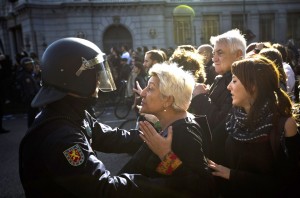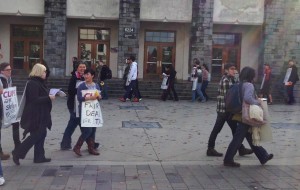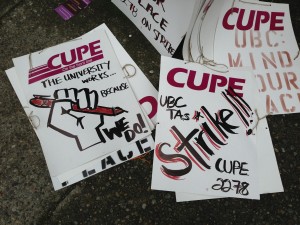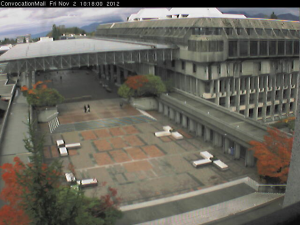Four faculty members at South Asian University (New Delhi, India) have been suspended pending investigation for asking the university not to call police inside the campus while student protests were going on and to resolve matters amicably.
Faculty also asked administration to withdraw punishment meted to students because due process of rules and regulations were not followed. Ravi Kumar, one of the suspended professors said, “This is unprecedented in the academic history where four faculty members have been suspended for suggesting measures in a constructive spirit.”
Brief chronology of incidents at South Asian University (SAU), New Delhi
- On October 14, 2022, faculty members wrote to the university administration against the act of calling police into the campus to disperse protesting students and to resolve internal issues.
- On November 4, 2022, the university administration issued office orders announcing expulsion, rustication or suspension of 5 students. On November 5, 2022, several faculty members wrote an email to the university community expressing their deep concern regarding these arbitrary actions of the university administration that were taken without following any due process and in gross violation of rules, regulations, and bye-laws, and were in contravention of principles of natural justice.
- Students began a mass indefinite hunger strike from November 7, 2022. Quite a few students had to be admitted to hospital on emergency basis to revive their physical condition. One of the five students who were expelled/rusticated/suspended, Ammar Ahmad (MA Sociology, Ist semester), collapsed on the night of November 22, 2022 and had to be admitted to the Intensive Care Unit (ICU) of a hospital. Till date Ammar’s speech remains severely affected, he cannot walk on his own, and remains fully dependent on care-givers for his daily functioning.
- On December 30, 2022, five faculty members received notices from the university administration asking them to respond to several charges, including: writing letters to the university community regarding certain administrative decisions in relation to the student protests (as noted above in points 1 and 2 above). The faculty members include: Dr. Snehashish Bhattacharya (Faculty of Economics), Dr. Srinivas Burra (Faculty of Legal Studies), Irfanullah Farooqi (Department of Sociology, Faculty of Social Sciences), and Dr. Ravi Kumar (Department of Sociology, Faculty of Social Sciences). These faculty members individually responded to the notice on January 16, 2023.
- The four faculty members were called to appear before a Fact Finding Committee (FFC) on Friday, May 19, 2023 for an interaction. During the interaction, the faculty members were asked to provide answers to between 132 and 246 questions in writing by the end of the working day, using pen and paper and sitting in front of the committee members. They were told that their responses might be used as evidence to decide on further proceedings against them. The questions included fresh (though unsubstantiated) allegations and accusations that were not part of the communication from the administration dated December 30, 2022, or the responses submitted on January 16, 2023.
- The four faculty members submitted a written request to the committee to send the questions electronically and to provide more time too. They also wrote to the Acting President on May 25, 2023, regarding this issue and seeking appointment. However, they have not heard back from the committee or from the Acting President yet in this regard.
- On June 16, 2023, office orders were issued placing the four faculty members under suspension with immediate effect, stating that “there are allegations of misconduct” and violation of the code of conduct of the University, “which need to be investigated.” The faculty members have been directed not to leave station without permission, vacate their offices, return their office computers and identity cards, and register their attendance on all working days in the offices of their respective deans.
- The faculty members responded to the Acting President in writing on June 19, 2023, terming the actions patently illegal as they have been taken in contravention of the rules and regulations of the university. They have called upon him to withdraw the orders at the earliest.
Action requested
The suspension of the faculty members should be revoked as it is a violation of the university rules, regulations and byelaws. The faculty members have been only requesting that the university to resolve matters within university and amicably.
*****
Jawaharlal Nehru University Teachers Association
New Delhi-110067
JNUTA Statement on arbitrary suspension of four faculty at South Asian University
The JNUTA strongly condemns the arbitrary suspension of four faculty by the South Asian University administration. The JNUTA sees this act as unacceptable, unjust, and an attempt to intimidate and spread fear among the teaching community.
The suspension notice issued to the faculty by the SAU administration on 16.06.2023 came after a spate of humiliation of the four faculty members by the Fact Finding Committee that on May 19, 2023, asked them to provide handwritten answers to over a hundred questions sitting in front of the committee members. The faculty raised objections to this process and wrote to the FFC and the SAU administration, but they received no reply. On the contrary, they were served with suspension orders that justified it by accusing the faculty of ‘inciting and leading students and outsiders’, and ‘anti-social acts’, among other things; without following due process of investigation. This illegal and unacceptable suspension notice has directed them not to leave the station without permission, vacate their offices, return their office computers and identity cards, and register their attendance on all working days in the offices of their respective deans.
The JNUTA strongly condemns this unprecedented harassment, coercion, and intimidation of the SAU faculty by the administration. There are several news reports that the University served notices and expelled/suspended/rusticated several students protesting against the reduction of monthly stipends without following the due process. Several faculty in SAU have also raised their concerns regarding the arbitrary actions of the university administration against the students. These notices of expulsion and rustication have put the students under tremendous stress, both mentally and physically.
The suspension order served to four faculty members by the SAU administration is an attempt to intimidate and silence the faculty and the students who raise their voice against the arbitrary and authoritarian actions of the administration. The JNUTA stands in complete solidarity with the faculty of SAU in defending their rights to speak truth to power. It also stands in support of the students of the SAU who have been protesting against the gross act of injustice of the SAU administration. The JNUTA demands that the suspension orders of SAU faculty and rustication/expulsion order of SAU students be immediately revoked and the administration start a dialogue to discuss the demands for an agreeable resolution at the earliest.
Sd/-
D K Lobiyal Avinash Kumar
President, JNUTA Secretary, JNUTA
*****
Janhastakshep: a campaign against fascist designs
Press release
24 June, 2023
Contact: drvikasbajpai@gmail.com; (M): 9717820427
Subject: Suspension of four faculty members at South Asian University, an extension of the continuing attacks on institutions of higher learning.
Janhastakshep unequivocally condemns the suspension of four faculty members – Dr Snehashish Bhattacharya (Faculty of Economics), Dr Srinivas Burra (Faculty of Legal Studies), Dr Irfanullah Farooqi (Department of Sociology) and Dr Ravi Kumar, also of the department of Sociology, at New Delhi’s South Asian University by the university administration and demands unconditional revocation of the suspension orders of all suspended faculty members with immediate effect.
The events leading up to the suspension, the manner of suspension and the subsequent conduct of the ‘Fact Finding Committee’ constituted by the university to conduct a sort of inquiry against the suspended faculty members reek of utterly cavalier attitude calculated to please the powers that be in the political circumstances obtaining in the country as of date.
The present suspension of faculty members is rooted in the events related to the agitation by the university’s students in November last on their legitimate democratic demands impacting on their immediate wellbeing. That agitation was handled with a heavy hand by the university authorities resulting in rustication and expulsion of the students. It led to serious consequences to the health of one student Ammar Ahmad and later to another Phd scholar Apoorva in the Faculty of Legal Studies.
The suspended faculty members were first handed notices on 30 December 2022 on charges such as – writing letters to university community questioning certain administrative decisions in relation to the student protests; instigating students to protest and association with a “Marxist” study circle among other allegations. In levelling these charges against the faculty, those sitting in top administrative positions at the University have exhibited regrettable lack of comprehension of a university’s function, the nature of the learning / teaching process and the responsibilities of the students, teachers and administration at institutions of higher learning towards each other.
No education, let alone new knowledge generation can be transacted if the students are not supported by their teachers and the administration in availing of amenities, including financial support, that facilitate their endeavors in this direction. A teacher and more so the administration shall be failing in their duty if such support and understanding were to be substituted with a ‘coercive disciplinary’ approach which unfortunately has been the dominant trend forced upon all manner of publicly funded institutions of higher learning in the country in last 9 years. It is nothing but a poor parody that the suspended faculty members have been accused of associating / encouraging a ‘Marxist Study Circle’ in a university space that is supposed to lend itself to a free contestation of ideas. This certainly sits at odds with the eulogy of ‘Indian Democracy’ proffered by Prime Minister Narendra Modi in Washington D C.
Even as Janhastakshep calls upon the different bodies of academicians and intellectuals at large to support the faculty and students of SAU in this hour of need, we also appeal that this suspension of faculty members should be seen as part of the larger thrust by the Modi led government to further curb the space for ideas which militate for Democratization of society, challenge authoritarianism, uphold economic and social justice. These suspensions are part of the efforts to terrorize and stultify the intelligentsia into submission.
Apart from revoking the suspension of the faculty members and continuing rustication of the students, the bunch of ‘Actors’ (Acting President, Acting Vice-President and Acting Registrar) complicit in ‘over-acting’, who are presently ruling the roost at SAU should be replaced with academics of repute and integrity capable of steering the university towards achieving its cherished goals.
– sd –
(Dr Vikas Bajpai) (Anil Dubey)
Convener Co-convener
Prof JNU Senior journalist
*****
Links to some of the press coverage:

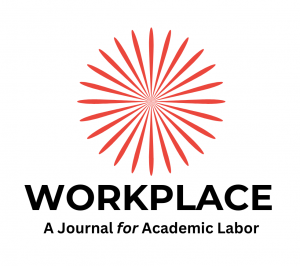
 Follow
Follow